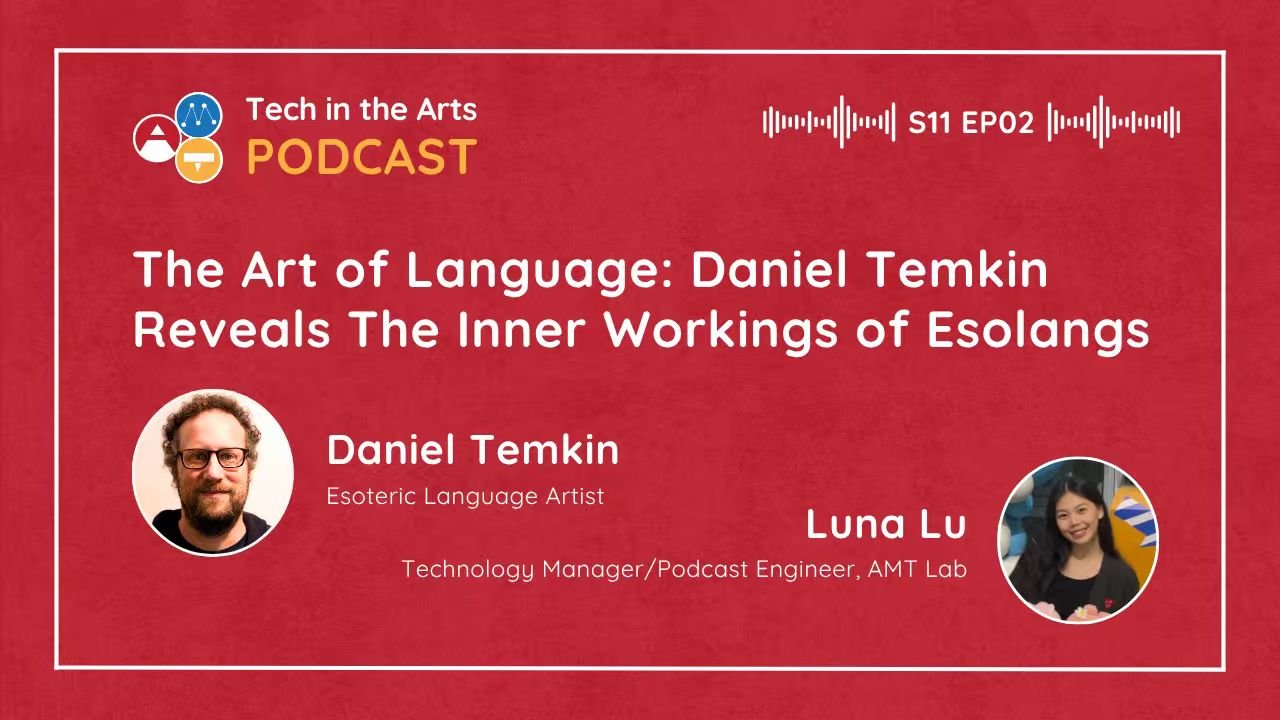In this episode of the Arts Management and Technology Lab, Daniel Temkin and Luna Lu discussed the artistic possibilities of code, focusing on esoteric programming languages (esolangs) and how they can function as a medium for art and human expression. Temkin explained that his interest began with experimenting in existing esolangs (like Brainfuck) around 2007-2008, leading him to create his own and document them conceptually, moving away from overly technical documentation. The conversation highlighted how giving up on the idea that programming must be practical allows for artistic exploration, connecting esolangs to idea art, constraint-based work (such as the Oulipo Group), and performance art. Temkin detailed the structure of his book, which presents programming languages as idea-based art, containing both realized works and conceptual prompts inspired by artists like Yoko Ono, and described how his languages — such as Fat Finger, which inspired code poetry, and Folders, which manipulates file system hierarchy — explore themes of collaboration, human irrationality, and the extreme constraints of logical systems. Listeners were also encouraged to explore existing esolangs on the Esolang Wiki before trying to design their own.
Politics and Portrayal: The Impact of AI and Our Lives
In this episode of the Arts Management and Technology Lab, Melida Hernandez and Christine Rivera dive into the intersections of technology, identity, and representation in digital spaces and media. Melida explores how AI-based recognition systems, often trained on biased datasets, misclassify transgender and non-binary individuals, which impacts their self-presentation, psychological well-being, and digital agency. Melida also discusses how these technologies replicate real-world prejudices, limiting the fluidity of gender expression online, and highlights the lack of diversity in AI research teams, where women make up only 10–15% of staff. Christine’s research, on the other hand, focuses on how scripted and streaming television depicts motherhood and women’s reproductive choices, connecting these portrayals to broader issues such as policy, workplace inequality, and the “motherhood penalty.” Together, they unpack how media archetypes, algorithmic bias, and social platforms shape public perception and reinforce gender roles, calling for more inclusive storytelling, equitable AI design, and better systemic support for women and marginalized communities.
Ethics, AI, and Sustainability in the Arts
In this episode of the Arts Management and Technology Lab, Hannah Brainard and Anuja Uppuluri explore two significant threats to artists and cultural institutions: the ethical and legal implications of Artificial Intelligence (AI), specifically its pre-training practices, and the impact of climate change on art and cultural heritage. They discuss how AI models often exploit artists' work without consent or compensation, leading to calls for dynamic consent systems, robust attribution, and fair compensation models.
The Future of Technology in the Performing Arts: VR versus Broadcast
Have you ever wished you could be front row for your favorite artist or see a sold-out Broadway show, all from your living room? Technology is making that a reality, from VR concerts with stars like Sabrina Carpenter to the National Theatre Live broadcasting plays live to cinemas or to your couch. But can a headset or a movie screen ever truly capture the magic of being there? In this episode, Alexann Sharp and Lehan Xu explore the technological revolution changing live entertainment and ask if we're gaining accessibility at the cost of authenticity.
Digital Marketing in the Age of AI: Insights from Grapeseed Media's Bill Updegraff
In this episode of Tech in the Arts, Dr. Brett Ashley Crawford of the Arts Management and interviews Bill Updegraff, founder and CEO of Grapeseed Media, a programmatic digital advertising firm. Grapeseed Media, established in 2013, has grown into a trusted partner for brands and agencies in digital advertising, earning recognition on Inc.’s 5000 list of fastest-growing private companies.
Cinematic VR for Public Service with Eric Williams and Jordan Herron
In this episode of Tech in the Arts, Sofia Akhmanaeva, AMT Lab’s social media manager, sits down with Eric Williams and Jordan Herron, presenters at this year’s SONA Immersive Storytelling Festival. At SONA, Williams and Herron presented a series of cinematic VR projects designed to support public service training. Using 360° filmmaking, they aimed to evoke empathy and create shared, memorable experiences.
Crafting Immersive Art with Amber Johnson at SONA Festival
In this episode of Tech in the Arts, AMT Lab’s Social Media Manager, Sofia Akhmanaeva, sits down with Amber Johnson, an Associate Professor of Simulation and Game Development at Wake Tech Community College. A presenter at Carnegie Mellon’s SONA Immersive Storytelling Festival, Johnson shares about the technology and inspiration behind her work.
DAF Strategies and Community Funds - A Talk with CharityVest
Donor advised funds - what are they? How are they being used? And what innovations are these peculiar giving vehicles introducing to the field of philanthropy? In this episode of Tech in the Arts, Lead Research Ian Hawthorne sits down with Rebecca Jacobs, head of community funds at CharityVest, a young, digitally native DAF sponsor.
Let's Talk: SXSW Shake-Up and the Future of Festivals
A shocking headline about SXSW’s music portion set the internet buzzing. Are big festivals on the decline, or are they simply evolving? Tune in as we break down the changes. In the Let’s Talk episode of Tech in the Arts, AMT Lab’s Podcaster Producer, Jinghong Gong, and Social Media Manager, Sofia Akhmanaeva, discuss the latest headlines.
Building Embodied Experience in Design and the Arts with Stephen Neely
In this episode of Tech in the Arts, Dr. Stephen Neely, associate professor at Carnegie Mellon University's School of Music, talks with the Sofia Akhmanaeva, AMT Lab’s Social Media and Marketing Coordinator. They discuss eurhythmics, a century-old practice focusing on the bodily engagement of music, and how these principles extend to modern interaction design. The conversation delves into the evolution of design practices and the need for a more holistic, user-centric approach in the digital age.










